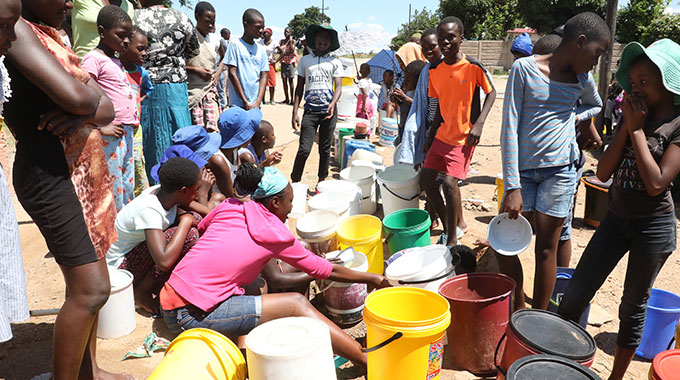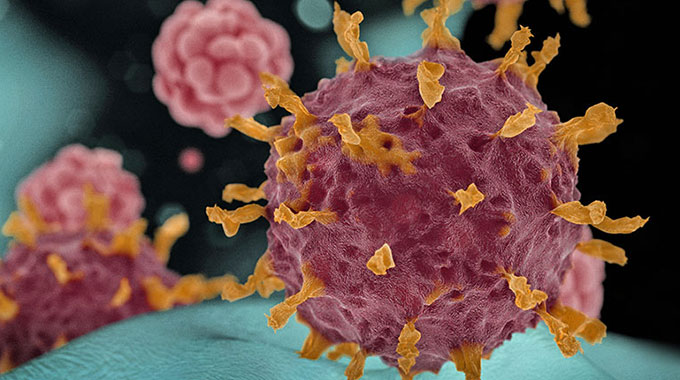Covid-19 spotlights service delivery failure

Yoliswa Dube-Moyo
SUDDENLY, the unadulterated fresh air becomes nauseating.
A strong stench steadily diffuses through the atmosphere as one drives deeper into Ngozi Mine, the city’s largest dump site where informal recycling assistants scavenge for recyclable material which they sell to companies in Harare.
The stench gets stronger and more revolting. And then there’s an influx of stubborn, high buzzing flies which come back after every swing of a folded newspaper.
Piles and piles of litter are spotted on either side of the road. Among the piles of litter are small shacks made of mostly scrap metal and hard wood built close together. Children are playing happily among the piles of litter, their little voices giggling at each other.
Ngozi Mine is filthy, smelly, fly-infested and generally unfit for human habitation yet about 100 families are settled in the close-knit squatter camp with no running water or ablution facilities, in the wake of the deadly Covid-19 which requires high hygiene levels and social distancing – a move experts believe will flatten the curve.
Covid-19 has been killing thousands globally with more being infected with the deadly coronavirus which causes Covid-19. In Zimbabwe, three cases and one death have so far been reported.
At Ngozi Mine, two women comfortably sit on the ground outside a shack while enjoying an afternoon chat.
“Sihlezi kuhle thina (We’re sitting pretty). We get water from a well in Cowdray Park. Amanzi akhona agobhoza phansi (We get the water from a well). I don’t know how safe it is but the water looks clean. We drink the water and use it for cooking and other domestic purposes. I’ve been staying here for five years despite the water challenges here,” said a combative Ms Andile Moyo, adding she had heard people speaking about Covid-19 on the radio.
She said poverty forced her into the crowded Ngozi Mine as she could not afford to feed herself and her two children.
“It’s better here because I can pick up litter which I sell to recycling companies. A kilogramme is worth $1. The money is not much but I save it until I can buy something meaningful. My relatives don’t know that I live here. They know I pick up litter for recycling but they don’t actually know that I live here and the conditions I live in,” says Ms Moyo as her three-year-old son sat on her lap while she waved off flies.
Through various initiatives, people are continually being reminded to wash their hands frequently as well as use hand sanitisers to slow down the spread of Covid-19, yet Ms Moyo does not always have water readily available.
Ms Rungano Mateura, the lady sitting next to her says, “Takutongoti (We’re just saying) so long life. You can’t prevent contracting coronavirus when you know this is your situation and there’s nothing you can do about it. We’re struggling to make ends meet and can’t afford to stay at home and do nothing, what will our children eat? If we fall sick, we fall sick. There’s really nothing we can do. We believe that God will take care of us and we won’t catch it. If we get coronavirus, we’ll deal with it then.”
Ngozi Mine is not the only overcrowded place in the city.
Across town is Burombo Flats in Nguboyenja suburb where one room accommodates up to 11 people. The flats have communal toilets with an average of 50 people sharing one.
In October 2018, the Minister of Health and Child Care, Dr Obadiah Moyo, condemned the flats as unfit for human habitation and a health time bomb.
Dr Moyo said the place faced an outbreak of both cholera and TB and implored council to urgently solve the water and sewer problems at the flats accommodating hundreds of residents.
However, plans to renovate the flats have since fallen through with fears it will be difficult to contain infections if one sweeps through the area.
No efforts have been made to disinfect frequently used knobs or surfaces, provide sanitisers or educate residents on the importance of hygienic practices.
It is impossible to implement social distancing which experts believe will be key in slowing down the spread of the virus.
Residents said despite water and ablution facilities being in a deplorable state, they had nowhere else to go.
“Our hands are tied. We have nowhere else to go. We’ve stopped using some toilets as they have become clogged. We’ve actually locked some of them because they’re blocked and smelly,” said Mr Mandla Sibanda, a resident at the flat.
The Government recently announced sweeping measures to stop the spread of coronavirus.
The measures include an immediate ban on gatherings around night clubs, bars, beerhalls, movie houses, swimming pools, gymnasiums and sporting activities until further notice.
All the country’s borders have been closed for all non-essential travel for both in-bound and out-bound traffic. Hospital visits have been reduced to one visit by one person per day, while public gatherings have been cut from 100 people to 50.
Informal markets remain open, but citizens are encouraged to limit their visits.
With regards to mass transport, new measures are expected for the safety of commuters.
“We’ve been hearing a lot about coronavirus and the importance of handwashing but in this environment, it’s difficult to achieve the requirements because we have no running water,” said Ms Zanele Nkiwane of Emthunzini suburb, as her children and their friends marched past singing, “We’re marching in the light of God.”
The township is not connected to electricity or water.
It is characterised by incomplete houses, potholed gravel roads, smelly uncollected garbage, open pit toilets and gulleys.
“They’re saying we must wash our hands frequently, sneeze or cough into toilet paper and avoid touching our eyes, nose and mouth but look at these children here, do you think they’re doing all that? I can assure you; no one is making a follow up on these children to see how they’re handling themselves,” said Ms Nkiwane.
She said much as she was aware of Covid-19 and its implications, residents in her area were incapacitated due to the unavailability of water.
“We walk long distances to fetch water. Once we have it, no one has the luxury to keep washing their hands with the precious liquid we work so hard to collect and bring back home. God is for us all; He knows our situation. He will take care of us,” said Ms Nkiwane.
Employers have started decongesting the work place with only critical staff expected to report for duty. In countries such as South Africa, India and the United Kingdom, countrywide shutdowns have been ordered.
The World Health Organisation warned that pandemic activity was accelerating, noting that it took only four days for cases to jump from 200 000 to 300 000.
It took only three days for cases to make the jump to 400 000. The total is currently at 495 086, according to the Johns Hopkins online dashboard. – @Yolisswa










Comments